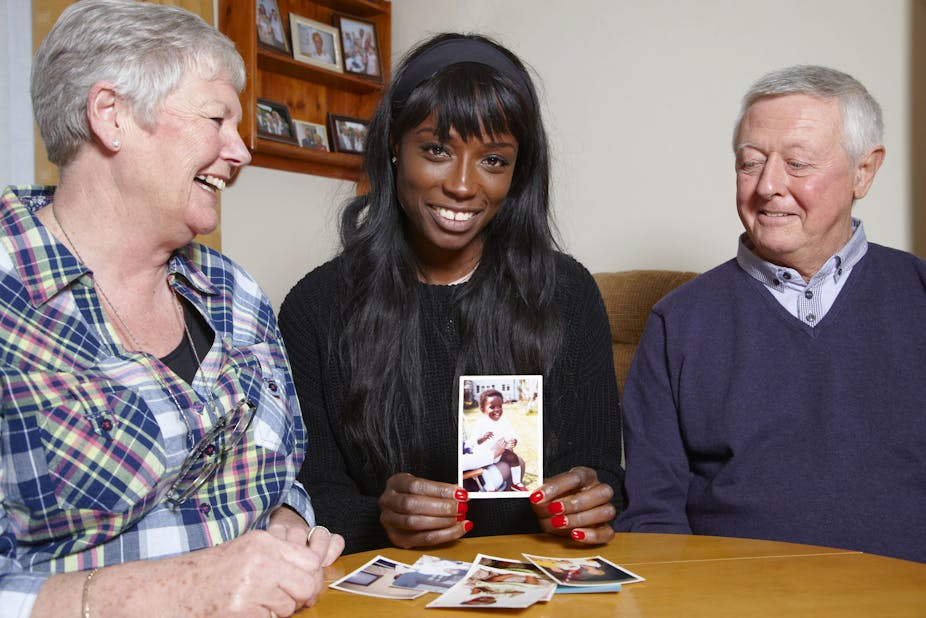In a recent BBC documentary, celebrity chef and former model Lorraine Pascale reflected on her turbulent experience of growing up as an adopted child; a period interspersed with time spent in foster care. Pascale was just one of many children who come into contact with the system in the UK.
Last March there were 68,110 children in the care of local authorities. Of these, 78% were white, 22% were black or from an ethnic minority background and three quarters were living with foster carers.
Pascale also raised some difficult questions as to whether ethnicity should be a factor in matching children with families. Pascale is of black Caribbean descent but experienced foster placements with white families. Within adoption and foster care, the focus on ethnic and cultural matching reflects the concern that looked after children may face difficulties in forming a positive identity and have a firm sense of belonging. Yet there isn’t a clear empirical basis to support this argument.
In fact, the issue of ethnicity is just one of several variables in the matching process, but it is superseded by emotional needs and the requirement for permanence.
For looked after children, the concept of permanence is about offering children a secure base, stability and care from childhood to independence. The process of matching children with families does consider ethnic and cultural heritage (and can delay the process of matching for black or ethnic minority children), but with a shortage of around 10,000 foster families each year it’s not a simple case of only matching children with foster parents of their own ethnicity. Pascale herself concluded that her Caribbean heritage did not lead to feelings of instability or being “unsettled” despite being cared for within a succession of white families.
Race and politics
Public understandings of foster care, and the complexity of the matching process, is further complicated by reporting of specific cases. In 2012, for example, three children of Eastern European descent were removed from their foster parents by their local authority in Rotherham when it became known that they were members of UKIP. Rotherham council’s action caused a national furore as their actions suggested that foster carers were barred from political membership.
The social workers involved reportedly informed the foster family that UKIP was a “racist” party and the implication was that carers associated with a racist party could not meet the cultural needs of non-British children. The local authority later apologised to the family – not for their decision to remove the children, but for the way that they did so.
The Rotherham case related to the foster family’s political persuasion but it highlights an instance where the cultural heritage of the family differed from the fostered children but where the situation was successful; the children were settled, and responding well to the care and nurturing offered by the foster family. Indeed, the foster family at the time of the removal spoke out about their desires to care for the children on a permanent basis.
Education secretary Michael Gove, who was himself adopted from the age of four months, condemned the council’s action, stating that “the ideology behind their decision is actively harmful to children. We should not allow considerations of ethnic or cultural background to prevent children being placed with loving and stable families.” While Gove makes a worthy point, as with the reporting of the Rotherham case, this shouldn’t be an excuse to take a pot shot at social workers.
Love and care is also important
Black and ethnic minority children who grow up in white foster families can develop into happy, successful and well rounded individuals. Indeed, Pascale has grown into a successful and well-rounded woman yet, as the documentary showed, she endured her unfair share of family problems within adoption and fostering settings. Perhaps Gove has this one thing right; the match between the cultural or ethnic heritage of a looked after child and their foster family is important, but not essential to the success of that placement and the nurturing of that child.
Gove’s position was enacted through the recent passing of the Children and Families Act 2014 which speeds up the adoption process and Gove has vociferously promoted a process for children awaiting adoption which does not cause delay or drift due to cultural matching (something that has been contested). This is not to say that identity needs aren’t important – as anyone who works with looked after children knows, these are critical – but the need for permanence along with other essentials such as education, love and care, safety, good health, greatly matter too.
And in relation to the foster placement breakdowns, there is little evidence to suggest that a cultural mismatch between a child and the foster family is a primary cause. Rather, what causes placements to breakdown is a complex mix of family composition, geography, the commitment and skills of the foster family in combination with the looked after child’s age, temperament and degree of challenging behaviour, prior experiences and willingness to be fostered. A cultural mismatch may be one of the factors within this mix.
Narratives like Pascale’s are important because there is a scarcity of long-term studies that explore whether the cultural identity of foster families affects long-term outcomes for black and ethnic minority children.
In addition to illustrating some of the complexities of foster care, Pascale also represents something else that is very important: an individual who has moved from the looked after system, with a mix of fostering and adoptive care, to successful adult life.

